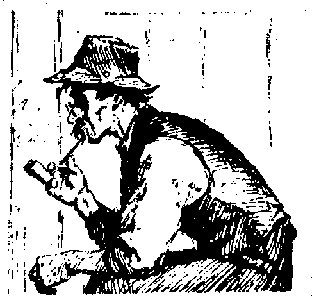
Last week in the midst of one of the season’s worst downpours, the Curmudgeon opened the door of the General Store.
Holding his 20-year-old outdoorsman’s canvas hat, originally purchased from Eddie Bauer, rolled up and wet in his left hand, a paper drink container labeled “Exotic Coffee” in his right, and a small pushcart with its handle deftly tucked within the slight depression between the rise of his stomach (above) and the large brass buckle of his John-Deere belt (below), pushed the door open so that he could enter the welcoming comfort of the emporium’s warm and gentle atmosphere.
“Will somebody help me with this cart?” he asked.
“Allow me—“ answered City-Fella who was there to collect his morning mail and one of two copies of The New York Times that were saved every morning, the other copy going to an unidentified person known only to Mr. and Mrs. Store-Keep.
“You seem to be a bit upset and, frankly, befuddled, Curmudge,” said Mr. Store-Keep. “Is there anything going on outside of the general state of things that has you looking as though you are flying, internally, from pillar to post?”
“Yes,” said Curmudgeon,” and it all revolves around the continued stupidity of Jeff Bezos, the owner of Amazon and his continuing effort to move the publishing industry back to the days when the best way to get information around was similar to a time when the Marquis de Sade was imprisoned in the Bastille and threw letters and pamphlets our of his cell window to excite the citizens to think about possibly revolting against the French aristocracy.
“How was that?” asked City-Fella.
“Well,” said Curmudgeon, “On July 2, 1789, de Sade was chiefly responsible for the storming of the Bastille where he was held as a prisoner at the behest of his mother-in-law along with a number of other fouler folk including some counterfeiters, a number of cardsharps, and a great many so-called simple people who were over their heads in debt, and using the same mentality found in the English debtor’s prisons, rather than putting debtors to work on fixing broken sewers or pulling crabgrass from local parks, they were interred just to keep them off the streets.
“Using a folded paper megaphone and tossing manuscript pages out of the window, de Sade incited the people below into aiding in his liberation by shouting through his makeshift megaphone: ‘They are killing prisoners here!’ As a result they moved de Sade to the hospital for the criminally insane where he was released in 1791 and became chair of one of the many tribunals for eventual beheading.”
“Before,” said Citi-Fella, “we get too deep let us simplify this all a bit, OK? Exactly, what did Mr. Bezos do?”
“In a very large nutshell,” sighed Curmudgeon, “he has attempted to take over some of the largest publishing companies in the business, like Random House or Penguin or Hachette in France, by slowing shipment of books they’ve published from Amazon warehouses while speeding up the shipment of books from companies that agree with him! So Amazon becomes another killing machine that can lead to an inevitable digital disruption in the book industry and bring said publishers into the true world of the 21st Century, where he will control all the e-books, regulate the prices, and decide who gets published and why.”
“Isn’t that illegal?” asked City-Fella.
“Sure, but that didn’t stop the banks from being too big to fail, and their successful romp through the last depression.”
Quietly, behind the main counter back where the coffee urns and the donuts lived, Mrs. StoreKeep took a larger than usual ceramic mug and adding extra sugar and cream, mixed a fresh cup of steaming coffee and carefully handed it to the Curmudgeon as she said:
“Curmudgeon,” she said, “what happened to our plans to balloon our way to Raleigh for a Moral Monday and bring the state’s attention to its precipitous fall into the abyss of ignorance so in the next election—which is creeping up as we speak—the citizens stop talking and get to the polls and vote the rapscallions out?”
“We’ve been sidetracked,” he said, “but as soon as the rain stops, I’ll get to work on our organization and off we will go into the wild blue yonder.”
“Let’s hope,” said City-Fella.
Peter Loewer has written and illustrated more than twenty-five books on natural history over the past thirty years.
